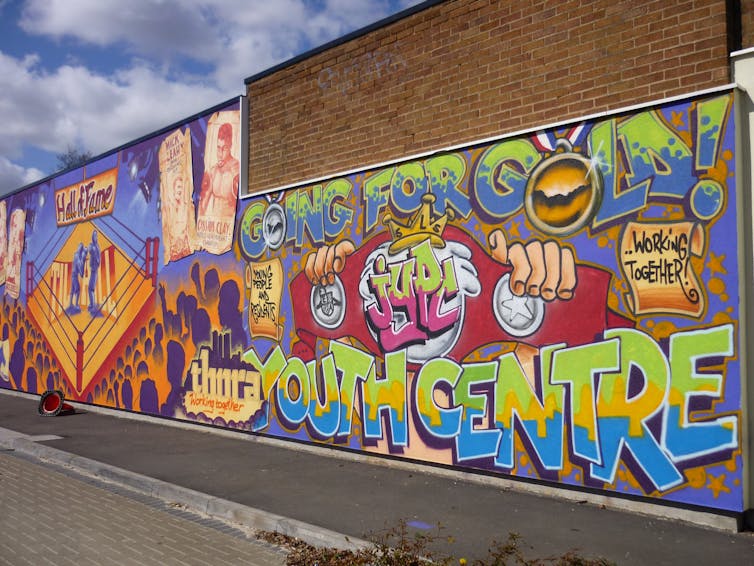The Labour Party has unveiled plans for a statutory youth service, with ring-fenced funding and a national body to oversee services provided across England. At the launch of the policy in London, the city’s mayor Sadiq Khan said that Labour’s measures would help turn young people away from violent crime, and help them fulfil their potential.
The move may be welcomed by politicians and youth workers who have campaigned for youth services to be placed on a stronger footing. But, by focusing on future outcomes, Labour’s plans repeat a well-worn pattern. Previous strategies from Labour, Coalition and Conservative governments used future outcomes to justify providing youth services – whether that’s increasing young people’s employability or contributions to society, or reducing the risk of crime and violence.
But this approach fails to acknowledge that young people have a right to services which they value in the present, and which empower them to set their own agenda in society.
Cuts and closures
Under law, local authorities have a duty to ensure young people can take part in activities to improve their well-being, and to provide the facilities to carry them out. But the duty only extends to activities that are “reasonably practicable”. This means there is no minimum level of service specified by law, and local authorities can prioritise other services.
Cuts to central government grants, together with the removal of ring-fenced funds, have led many local authorities to reduce or withdraw their own youth services and cut grants to other providers. Recent figures show that spending on services for young people was £787.2m in 2011-12, but fell to £364.9m by 2017-18 – that’s a reduction of £422.3m. Since 2010, it’s estimated that more than 3,500 youth service jobs have been lost, more than 600 centres have been closed and more than 130,000 places for young people have been eliminated.

The piecemeal spending by the Coalition and Conservative governments has focused on a limited number of initiatives, in particular the National Citizen Service (NCS). But the House of Commons Public Accounts Committee has questioned its future and value for money, due to high costs (£1,863 per participant in 2016), unfilled places and limited evidence of any long-term impact.
Growing up
The current approach to youth services can be traced back to the philanthropic organisations which emerged during the industrial era to occupy young working class people with wholesome activities, and prepare them for roles in society that were deemed appropriate for their class and sex.
But while young people may now be – or at least, may feel themselves to be – less limited by social divisions such as class, gender, ethnicity or religion when making choices about their future, the transition into adulthood has also become longer, more varied and more precarious. Rites of passage such as leaving home can be delayed, as young people struggle to earn enough to meet rising housing costs.
Successive governments’ policies have promised to produce young people who can negotiate these complex and risky transitions. The Coalition government’s 2011 policy, Positive for Youth, followed earlier youth strategies in emphasising the importance of supportive relationships and opportunities to help young people achieve their ambitions.

There’s evidence that youth services and valued relationships with youth workers benefit young people. But the coalition was also criticised for cutting funding to the very youth workers whose work it praised. Under Positive for Youth, there was a move away from state-run or state-supported voluntary services (justified by social benefits) towards other providers, which were either unsupported and volunteer run, or profit-driven and an opportunity for corporate investment.
A more radical reform
The current government recently invited comments on the future of youth services, as part of a broader consultation to shape the new Civil Society Strategy, which sets out to define civil society and its relationship with the state. The consultation is intent on finding ways to support young people to “achieve important outcomes”, encourage “youth social action” in communities and get young people participating in national policy.
The consultation clearly frames youth services in terms of the outcomes they can produce. There is still a focus on employability, and “social action” here means encouraging young people to improve their own lives, solving “their” problems, taking over services or performing “simple neighbourly acts”. And while there’s an encouraging emphasis on young people actively shaping local and national policy with some practical ideas for development, these will need proper funding to become a reality.

Under the current government, youth services look set to further embed an emphasis on civic responsibility, while young people’s entitlements – to affordable housing, secure employment and educational and recreational services – are side-lined. And although Labour’s plans may do more to secure funding and embed services in local authorities across England, they will be weakened if youth services are seen only as a tool for shaping law-abiding and employment-ready young people.
There are a few promising signs: the All Party Parliamentary Group for Youth Affairs (APPG) and the National Youth Agency have launched a national inquiry into youth work, calling for evidence about key challenges faced by young people, whether these are addressed by current youth service provisions, and whether there’s enough training and funding to support youth workers. The APPG and NYA represent youth work as a means to promote equality, challenge discrimination and champion the positive place for young people in society, as well as a way of building confidence and skills.
A more radical approach to youth work and services would support young people to identify and collectively challenge the factors that threaten their security and well-being. If any future government – Labour, Conservative or otherwise – truly wishes to empower young people, they will have to be bold enough to take a more politicised view of social action and value youth workers as educators and advocates – not just policy instruments.

